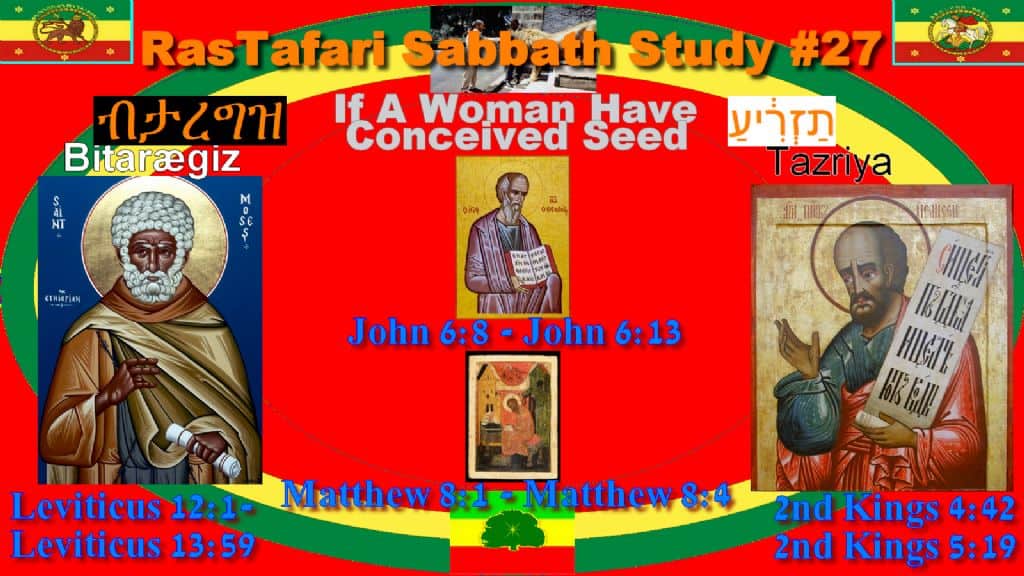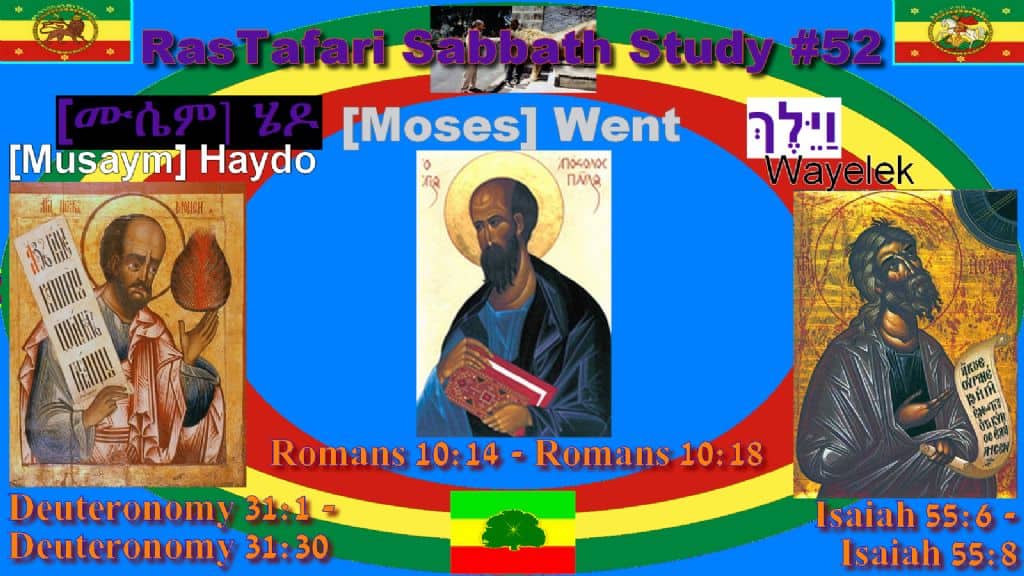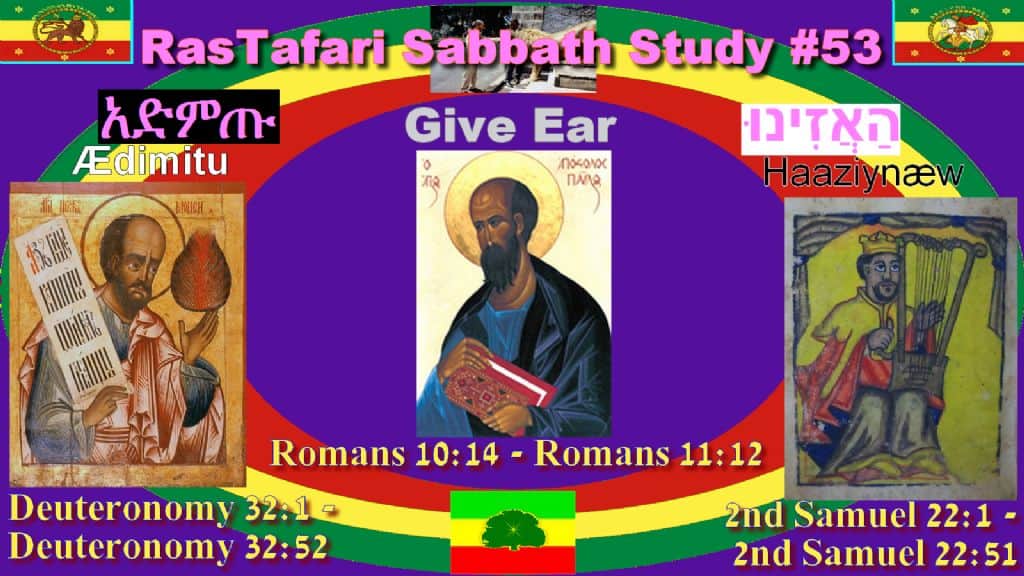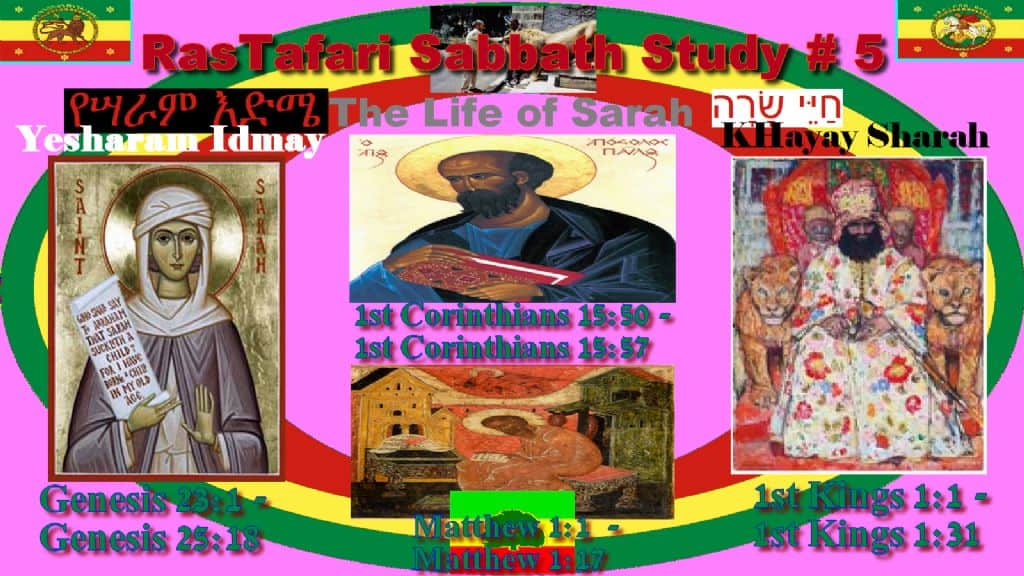This Week's Portion #27-28
Tazria-Metzora | תזריע-מצורע | "She conceives-Leper" ብታረግዝ-በመንጻቱ ቀን | b’tareg’z [btaregz; bittarregiz]/beMenTs’atu [Qen]
*For a PDF version of All the Torah Portions Schedule, click here to download!
1. Torah Reading
Tazria
2. Prophets Reading
2 Kings 4:42-5:19/2 Kings 7:3-20
3. New Testament Reading
John 6:8-13; Matthew 8:1-4/Matthew 8:1-17
Portion Outline - TORAH
- Leviticus 12:1 | Purification of Women after Childbirth
- Leviticus 13:1 | Leprosy, Varieties and Symptoms
- Leviticus 14:1 | Purification of Lepers and Leprous Houses
- Leviticus 15:1 | Concerning Bodily Discharges
Portion Outline - PROPHETS
- 2 Kings 7:3 | The Arameans Flee
Portion Study Book Download & Summary
 VAYIKRA Hebrew Book of Leviticus - Torah Portion Vol.3 (FREE PDF)
VAYIKRA Hebrew Book of Leviticus - Torah Portion Vol.3 (FREE PDF)
Tazria The name of the twenty-seventh reading from the Torah is Tazria (תזריע), which means “she conceived.” The name is derived from the words of Leviticus 12:2, where the LORD says to Moses, “When a woman [conceives] and bears a male child ...” Leviticus 12 discusses the laws of purification after childbirth. Leviticus 13 introduces the laws for diagnosing and quarantining lepers. Except in biblical calendar leap years, Tazria is read together with the subsequent Torah portion, Metzorah, on the same Sabbath.
Metzora The twenty-eighth reading from the Torah is Metzora (מצורע), a word that means “leper.” The word appears in the second verse of the reading, which says, “This shall be the law of the leper in the day of his cleansing” (Leviticus 14:2). Leviticus 14 spells out the complex purification rituals for the cleansing of a leper and a leprous home. Leviticus 15 briefly covers the laws regarding ritual unfitness stemming from bodily emissions. Except in biblical calendar leap years, Metzora is read together with the previous Torah portion, Tazria, on the same Sabbath.
Portion Commentary - Tazria
The Sin of Childbirth
Thought for the Week:
The sacrifices after childbirth remind us that the act of giving birth is itself a miraculous encounter with the Divine. It is not to be regarded as just ordinary life. Instead, the Torah grants the event sanctity and significance by requiring sacrifices. The new baby is a gift from God, and the mother naturally wants to reciprocate with a gift. She brings a burnt offering and a sin offering as her gifts to God, who blessed her with a child.
Commentary:
After the mother's days of purification were completed, she was readmitted to the Tabernacle and the sacrificial service. At that time she was required to bring a burnt offering and a sin offering to the LORD (Leviticus 12:6). The sin offering seems troubling. Did the woman sin by having a baby? On the contrary, she was fulfilling the commandment to be fruitful and multiply. Why did she need to bring a sin offering?
The Talmud explains that when a woman is in the pain of childbirth, she might inadvertently curse her husband or take a vow never to let him touch her again, and because of that, she must bring a sin offering to exonerate herself from her rash vow or her resentful thoughts. Women who have gone through the pain of childbirth may find this explanation amusing and even concur with some of the sentiments, but this is hardly a credible interpretation.
A simpler explanation is that sin offerings were often brought for purification purposes. When that happened, the sin offering was not a punishment for sin or a consequence of iniquity, it was simply part of the purification ritual. Along similar lines, a person who suffered an unnatural bodily discharge and a person being purified of leprosy also brought sin offerings.
On a mystical level, the mother's forty- or eighty-day journey through ritual unfitness is like a microcosm for her baby's own odyssey through life. Prior to having the baby, the woman was in a state of ritual fitness. She enjoyed the presence of God in His holy dwelling place and was fit to eat from His table. After childbirth there was a period of time during which she was unable to enter the dwelling place of God. At the conclusion of that time, the woman was readmitted to the Tabernacle through the atonement of a sin offering. This progression of events symbolizes the baby's own passage through life. Her soul begins in the eternal dwelling place of God, but her birth in human flesh requires a departure from that place and a sojourn outside of God's heavenly tabernacle. After an allotted period of time, though, the soul leaves the body to return to God:
Then the dust will return to the earth as it was, and the spirit will return to God who gave it. (Ecclesiastes 12:7)
Through the atonement of Messiah's timeless sin offering, the soul of the believer returns to fellowship with her source. The mother's readmission to the Tabernacle might be said to symbolize the eventual return of the new life to God.
Portion Commentary - Metzora
Messiah the Avenger
Thought for the Week:
Messiah is our redeemer. He has redeemed us from slavery, from sin, from condemnation and from death. He is our kinsmen redeemer, our brother in the house of God, who has ransomed us from the debt we could not pay. Therefore, we speak of Him as redeemer. He is also the national redeemer of Israel. Just as Moses, the first redeemer, redeemed all Israel from slavery, so too the second redeemer, Messiah, redeems the whole nation. And this great second redemption is not only a spiritual redemption, but it is the literal, physical redemption of Israel. He will gather the descendants of Abraham, Isaac and Jacob from the nations, and restore them to the land of Israel.
Commentary:
The blood avenger himself shall put the murderer to death; he shall put him to death when he meets him. (Numbers 35:19)
Messiah is the redeemer of Israel. In the Bible, the job of a kinsmen redeemer includes taking blood vengeance. Therefore, if Messiah is to redeem Israel, He must also avenge Israel. He will require recompense in blood for every drop of Jewish blood that has been spilled, and for every drop of His disciple’s blood, whether Jew or Gentile. Psalm 110 says, “He will judge among the nations, He will fill them with corpses, He will shatter the chief men over a broad country. He will drink from the brook by the wayside; therefore He will lift up His head.” (Psalm 110:6–7)
Psalm 9:12 speaks of God as the redeemer, the blood avenger, when it says, “He who requires blood remembers them; He does not forget the cry of the afflicted.” Psalm 79:10 says, “Why should the nations say, ‘Where is their God?’ Let there be known among the nations in our sight, vengeance for the blood of Your servants which has been shed.”
The implications of Messiah coming to avenge the blood of Israel is frightening when we consider that the Church has been, historically, the chief spiller of Israel’s blood. In the name of Christ, literally hundreds and hundreds of thousands, even millions of Jews have been ruthlessly killed through the centuries.
The book of Revelation depicts the souls of martyrs crying out to God for vengeance:
“How long, O Lord, holy and true, will You refrain from judging and avenging our blood on those who dwell on the earth?” ... and they were told that they should rest for a little while longer, until the number of their fellow servants and their brethren who were to be killed even as they had been, would be completed also. (Revelation 6:9–11)
In Deuteronomy, the LORD says, “Vengeance is Mine, and retribution,” (Deuteronomy 32:35) The prophet Isaiah assures us, “Take courage, fear not. Behold, your God will come with vengeance; the recompense of God will come, but He will save you.” (Isaiah 35:4) All of these texts combine to paint a dire picture of Messiah’s second coming. When He comes again, He comes as the avenger of His people.


![RSS 27: Tazria | מצורע | She conceives ብታረግዝ | b’tareg’z [btaregz; bittarregiz] RSS 27: Tazria | מצורע | She conceives ብታረግዝ | b’tareg’z [btaregz; bittarregiz]](https://rastafarigroundation.org/wp-content/uploads/2019/03/Discipleship-Radi0-RasTafari-Bible-Readings-27_.jpg)
![RSS 27: Tazria | מצורע | She conceives ብታረግዝ | b’tareg’z [btaregz; bittarregiz] RSS 27: Tazria | מצורע | She conceives ብታረግዝ | b’tareg’z [btaregz; bittarregiz]](https://rastafarigroundation.org/wp-content/uploads/2019/03/Discipleship-Radi0-RasTafari-Bible-Readings-27_2_.jpg)
![RSS 27: Tazria | מצורע | She conceives ብታረግዝ | b’tareg’z [btaregz; bittarregiz] RSS 27: Tazria | מצורע | She conceives ብታረግዝ | b’tareg’z [btaregz; bittarregiz]](https://rastafarigroundation.org/wp-content/uploads/2019/03/Discipleship-Radi0-RasTafari-Bible-Readings-27_2_1_.jpg)
![RSS 27: Tazria | מצורע | She conceives ብታረግዝ | b’tareg’z [btaregz; bittarregiz] RSS 27: Tazria | מצורע | She conceives ብታረግዝ | b’tareg’z [btaregz; bittarregiz]](https://rastafarigroundation.org/wp-content/uploads/2019/03/Discipleship-Radi0-RasTafari-Bible-Readings-27_2_1.jpg)
![RSS 27: Tazria | מצורע | She conceives ብታረግዝ | b’tareg’z [btaregz; bittarregiz] RSS 27: Tazria | מצורע | She conceives ብታረግዝ | b’tareg’z [btaregz; bittarregiz]](https://rastafarigroundation.org/wp-content/uploads/2019/03/Discipleship-Radi0-RasTafari-Bible-Readings-27_2.jpg)
![RSS 28: Metzora | תזריע | Leper በመንጻቱ ቀን | beMenTs’atu [Qen] RSS 28: Metzora | תזריע | Leper በመንጻቱ ቀን | beMenTs’atu [Qen]](https://rastafarigroundation.org/wp-content/uploads/2019/03/Discipleship-Radi0-RasTafari-Bible-Readings-28_.jpg)
![RSS 28: Metzora | תזריע | Leper በመንጻቱ ቀን | beMenTs’atu [Qen] RSS 28: Metzora | תזריע | Leper በመንጻቱ ቀን | beMenTs’atu [Qen]](https://rastafarigroundation.org/wp-content/uploads/2019/03/Discipleship-Radi0-RasTafari-Bible-Readings-28_2_.jpg)
![RSS 28: Metzora | תזריע | Leper በመንጻቱ ቀን | beMenTs’atu [Qen] RSS 28: Metzora | תזריע | Leper በመንጻቱ ቀን | beMenTs’atu [Qen]](https://rastafarigroundation.org/wp-content/uploads/2019/03/Discipleship-Radi0-RasTafari-Bible-Readings-28_2_1_.jpg)
![RSS 28: Metzora | תזריע | Leper በመንጻቱ ቀን | beMenTs’atu [Qen] RSS 28: Metzora | תזריע | Leper በመንጻቱ ቀን | beMenTs’atu [Qen]](https://rastafarigroundation.org/wp-content/uploads/2019/03/Discipleship-Radi0-RasTafari-Bible-Readings-28_2_1_1.jpg)
![RSS 28: Metzora | תזריע | Leper በመንጻቱ ቀን | beMenTs’atu [Qen] RSS 28: Metzora | תזריע | Leper በመንጻቱ ቀን | beMenTs’atu [Qen]](https://rastafarigroundation.org/wp-content/uploads/2019/03/Discipleship-Radi0-RasTafari-Bible-Readings-28_2_1_2.jpg)
![RSS 28: Metzora | תזריע | Leper በመንጻቱ ቀን | beMenTs’atu [Qen] RSS 28: Metzora | תזריע | Leper በመንጻቱ ቀን | beMenTs’atu [Qen]](https://rastafarigroundation.org/wp-content/uploads/2019/03/Discipleship-Radi0-RasTafari-Bible-Readings-28_2_1.jpg)
![RSS 28: Metzora | תזריע | Leper በመንጻቱ ቀን | beMenTs’atu [Qen] RSS 28: Metzora | תזריע | Leper በመንጻቱ ቀን | beMenTs’atu [Qen]](https://rastafarigroundation.org/wp-content/uploads/2019/03/Discipleship-Radi0-RasTafari-Bible-Readings-28_2.jpg)






































































































